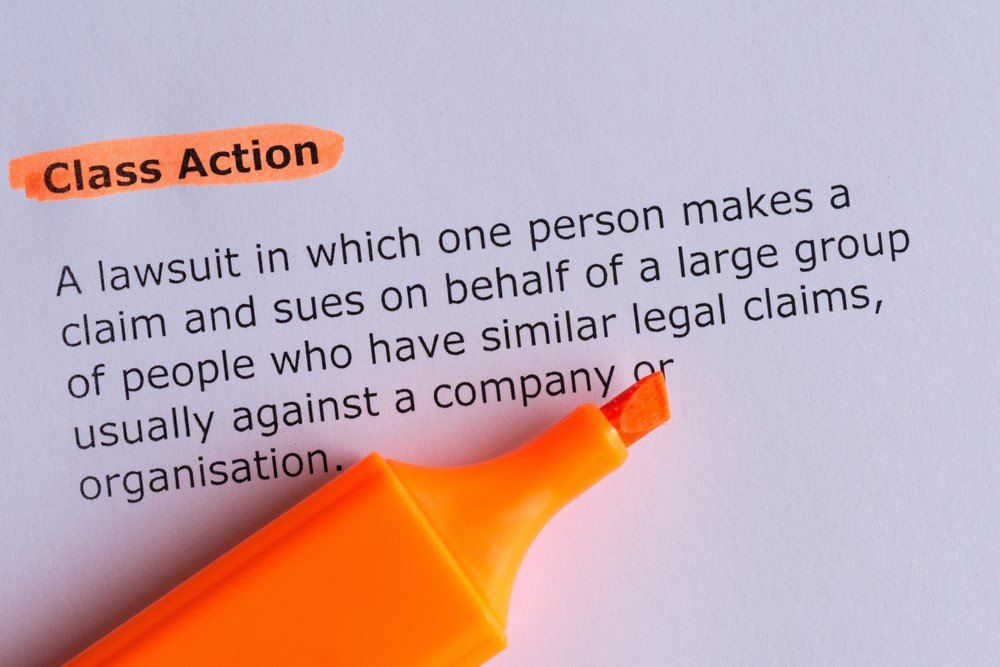The Archer-Daniels-Midland Class Action Lawsuit Unpacked: Stay Educated
Wiki Article
Demystifying Course Action Legal Actions: A Closer Take A Look At Legal Proceedings
Course action lawsuits can be intimidating and intricate, usually shrouded in a veil of mystery for those not familiar with the legal proceedings included. However, obtaining a much deeper understanding of these legal actions is vital, as they work as an effective tool for individuals to look for justice and hold corporations answerable. In this conversation, we will debunk course activity claims, taking a closer check out the various elements of the lawful proceedings. From recognizing the criteria for class activity qualification to the role of course reps, and from the process of class accreditation to the resolution of these legal actions, we will unwind the details and dropped light on the internal workings of this legal device. Let's dive right into the globe of course activity suits and discover the ins and outs that lie under the surface area.Recognizing Course Activity Legal Actions
Recognizing Course Activity Claim requires an extensive evaluation of the legal proceedings involved in collective lawsuits. Course activity claims are a type of lawsuit where a team of people with comparable cases or complaints sign up with with each other to start a suit against a common defendant. This kind of lawsuits enables individuals with limited sources to jointly seek justice, as it integrates the strength of multiple specific insurance claims into a single lawsuit.The process starts with the recognition of a lead plaintiff or course agent who submits the preliminary grievance on behalf of the whole class. The court after that establishes whether the situation fulfills the demands for class qualification, that include commonality, numerosity, typicality, and competence of representation. If certified, the court informs potential course participants, providing them a chance to opt-out if they desire to pursue their claims independently.
Once the course is accredited, the lawsuits proceeds via various phases, including exploration, motion technique, and, if necessary, test. The outcome of the legal action can result in a judgment or a negotiation, which is binding on all class participants unless they choose to opt-out. Course activity suits can incorporate a wide variety of legal concerns, such as customer protection, securities scams, work discrimination, and environmental injury.
Understanding the subtleties of course action claims is vital for both offenders and plaintiffs included in cumulative lawsuits. It requires a thorough understanding of the lawful requirements for certification, the rights and commitments of class participants, and the possible advantages and risks related to seeking or safeguarding versus course activity claims.
Identifying Class Action Qualification
To establish whether a lawful activity qualifies as a course action lawsuit, particular requirements need to be fulfilled. These standards are designed to ensure that the case can sufficiently represent the rate of interests of a big group of individuals who have suffered similar harm or have been affected by the same problem. The vital consider recognizing course activity qualification is the existence of a typical concern or issue that affects all prospective course members.First of all, a class action legal action calls for numerosity, which suggests there have to be a substantial variety of prospective class participants entailed. This makes sure that a class action is an efficient means to settle the insurance claims of a big group of individuals, as opposed to having each person file a specific claim.
Secondly, there must be commonness among the claims of the possible course participants. This indicates that there should be a common inquiry of legislation or fact that is main to the situation. A class activity may not be ideal. if each possible class participant's insurance claim is unique and unconnected to the others.

The Role of Course Representatives
Class agents play an essential function in course action suits by standing for the interests of the entire class. These people are picked from within the class to serve as the general public face of the lawsuit and are accountable for making choices in behalf of all class members. The function of course reps involves various obligations and tasks throughout the lawful process.
One of the primary responsibilities of course reps is to offer details and assistance to their fellow class members. They work as a point of get in touch with and interaction in between the course participants and the lawyers representing them. This consists of maintaining the course participants educated around vital updates, addressing their inquiries, and addressing any issues they may have.
Course agents also have the duty to actively join the lawsuits process (Future FinTech class action lawsuit). This includes working very closely with the lawyers to establish legal approaches, collecting evidence, and providing statement if a knockout post required. They must be proactively associated with all elements of the case to make certain that the finest rate of interests of the whole course are represented
Additionally, class reps are accountable for approving negotiations or other resolutions gotten to in the suit. They have to very carefully evaluate the regards to the settlement and make a decision that is in the very best interest of the entire class. This decision-making procedure needs mindful factor to consider their website and consultation with the course participants.
The Process of Course Accreditation
The procedure of certifying a course in a class action legal action includes a comprehensive analysis of particular standards to identify if the instance meets the needed needs for class accreditation. Course certification is a critical step in the litigation procedure as it determines whether a suit can continue as a course action, allowing a big team of people with similar insurance claims to be stood for jointly by one or a couple of individuals.To get class qualification, the complainant should show that the proposed class satisfies certain requirements. Typicality calls for that the cases or defenses of the course agents are normal of those of the class. Adequacy of representation ensures that the course reps will rather and adequately protect the passions of the course.
If the proposed course satisfies the required needs,The court will certainly scrutinize these standards and the complainant's evidence to establish. The court might additionally think about other variables, such as whether a course action is the premium technique to deal with the disagreement and whether the class is completely natural.

When the court grants course accreditation, the lawsuit can continue as a class action, permitting the complainants to collectively seek alleviation and potentially receive a judgment or negotiation that profits the whole course.
Dealing With Class Activity Legal Actions
When class qualification has actually been given, the following action in fixing a class activity suit is to browse the process of lawsuits or negotiation negotiations. Lawsuits refers to the lawful procedures in court, where the complainant's attorney presents proof and arguments to sustain their claims, and the offender's attorney counters with their very own evidence and debates. This process can entail different phases, such as pretrial movements, discovery, and test. During pretrial motions, both celebrations may submit movements to dismiss the instance or limit the concerns in contention. Exploration allows each side to collect evidence wikipedia reference and info from the other event through approaches such as file demands, depositions, and interrogatories. Finally, if the instance continues to trial, both events provide their case before a court or jury, that will certainly then make a decision the outcome.On the various other hand, negotiation negotiations involve conversations in between the celebrations to reach an equally acceptable resolution without going to test. Negotiation uses might be made at any phase of the lawsuits procedure, and if both events concur, a settlement arrangement is gotten to.
Conclusion
To conclude, course action lawsuits play an essential duty in supplying justice and payment to large teams of individuals that have been damaged by the exact same entity. By certifying a course and assigning class reps, the legal procedure becomes extra accessible and effective for the plaintiffs. Dealing with these suits can be a facility and prolonged procedure, but it is crucial in holding corporations answerable for their actions and making certain fair end results for all impacted events.From understanding the standards for course action qualification to the role of class reps, and from the procedure of class accreditation to the resolution of these lawsuits, we will decipher the details and shed light on the internal operations of this legal mechanism. The crucial variable in identifying class activity qualification is the presence of a typical concern or concern that affects all prospective course participants.
If each possible class member's insurance claim is special and unconnected to the others, a class activity might not be suitable.
Course reps play a crucial role in class action suits by representing the rate of interests of the whole course.When course qualification has actually been granted, the following action in resolving a class action lawsuit is to navigate the process of litigation or negotiation arrangements.
Report this wiki page